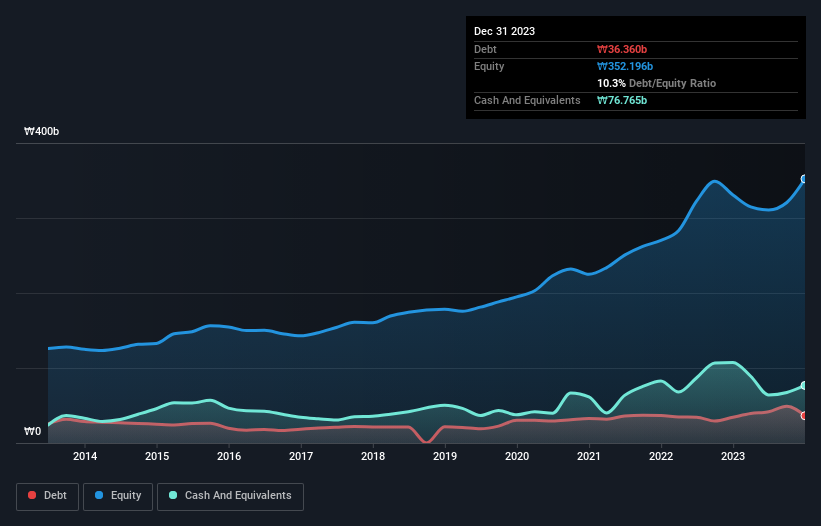Some say volatility, rather than debt, is the best way to think about risk as an investor, but Warren Buffett famously said that 'Volatility is far from synonymous with risk.' So it might be obvious that you need to consider debt, when you think about how risky any given stock is, because too much debt can sink a company. We can see that TSE Co., Ltd (KOSDAQ:131290) does use debt in its business. But the more important question is: how much risk is that debt creating?
What Risk Does Debt Bring?
Debt assists a business until the business has trouble paying it off, either with new capital or with free cash flow. Part and parcel of capitalism is the process of 'creative destruction' where failed businesses are mercilessly liquidated by their bankers. However, a more usual (but still expensive) situation is where a company must dilute shareholders at a cheap share price simply to get debt under control. Having said that, the most common situation is where a company manages its debt reasonably well - and to its own advantage. When we examine debt levels, we first consider both cash and debt levels, together.
See our latest analysis for TSE
How Much Debt Does TSE Carry?
The image below, which you can click on for greater detail, shows that at December 2023 TSE had debt of ₩36.4b, up from ₩34.3b in one year. But it also has ₩76.8b in cash to offset that, meaning it has ₩40.4b net cash.

A Look At TSE's Liabilities
We can see from the most recent balance sheet that TSE had liabilities of ₩61.0b falling due within a year, and liabilities of ₩30.0b due beyond that. On the other hand, it had cash of ₩76.8b and ₩67.5b worth of receivables due within a year. So it actually has ₩53.3b more liquid assets than total liabilities.
This short term liquidity is a sign that TSE could probably pay off its debt with ease, as its balance sheet is far from stretched. Succinctly put, TSE boasts net cash, so it's fair to say it does not have a heavy debt load! There's no doubt that we learn most about debt from the balance sheet. But ultimately the future profitability of the business will decide if TSE can strengthen its balance sheet over time. So if you're focused on the future you can check out this free report showing analyst profit forecasts.
In the last year TSE had a loss before interest and tax, and actually shrunk its revenue by 27%, to ₩249b. That makes us nervous, to say the least.
So How Risky Is TSE?
While TSE lost money on an earnings before interest and tax (EBIT) level, it actually booked a paper profit of ₩121m. So taking that on face value, and considering the cash, we don't think its very risky in the near term. We'll feel more comfortable with the stock once EBIT is positive, given the lacklustre revenue growth. The balance sheet is clearly the area to focus on when you are analysing debt. However, not all investment risk resides within the balance sheet - far from it. For example - TSE has 3 warning signs we think you should be aware of.
If, after all that, you're more interested in a fast growing company with a rock-solid balance sheet, then check out our list of net cash growth stocks without delay.
Valuation is complex, but we're here to simplify it.
Discover if TSE might be undervalued or overvalued with our detailed analysis, featuring fair value estimates, potential risks, dividends, insider trades, and its financial condition.
Access Free AnalysisHave feedback on this article? Concerned about the content? Get in touch with us directly. Alternatively, email editorial-team (at) simplywallst.com.
This article by Simply Wall St is general in nature. We provide commentary based on historical data and analyst forecasts only using an unbiased methodology and our articles are not intended to be financial advice. It does not constitute a recommendation to buy or sell any stock, and does not take account of your objectives, or your financial situation. We aim to bring you long-term focused analysis driven by fundamental data. Note that our analysis may not factor in the latest price-sensitive company announcements or qualitative material. Simply Wall St has no position in any stocks mentioned.
About KOSDAQ:A131290
TSE
Provides semiconductor test solutions in South Korea and internationally.
Flawless balance sheet with proven track record.
Similar Companies
Market Insights
Community Narratives


Recently Updated Narratives


The Quiet Giant That Became AI’s Power Grid


Nova Ljubljanska Banka d.d will expect a 11.2% revenue boost driving future growth



